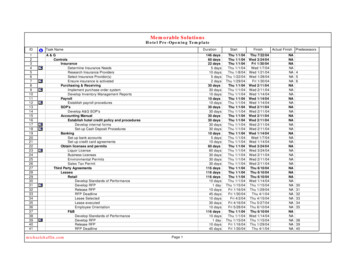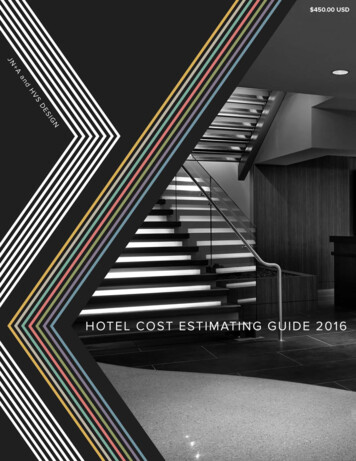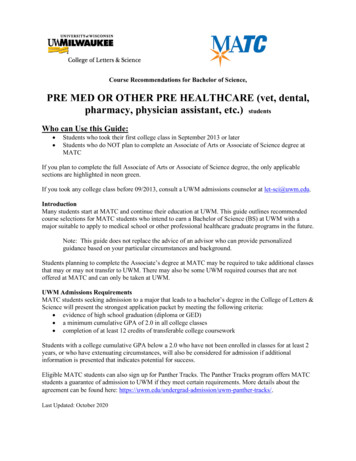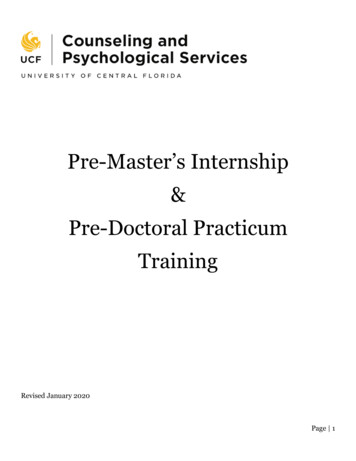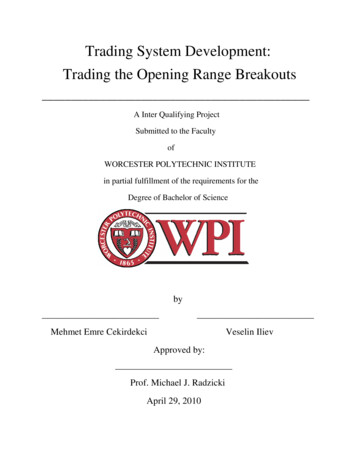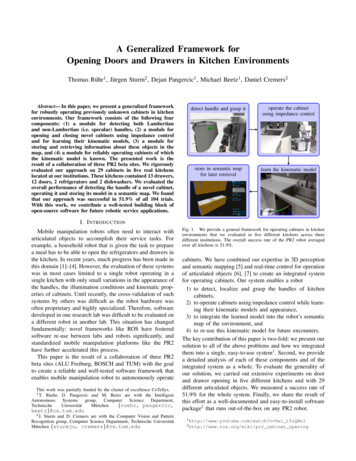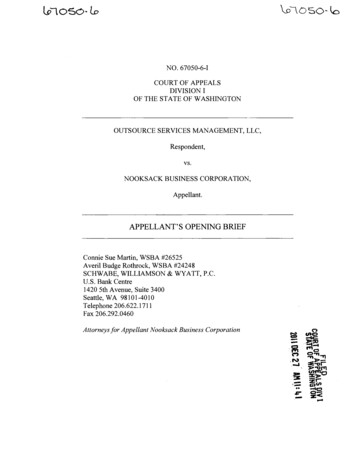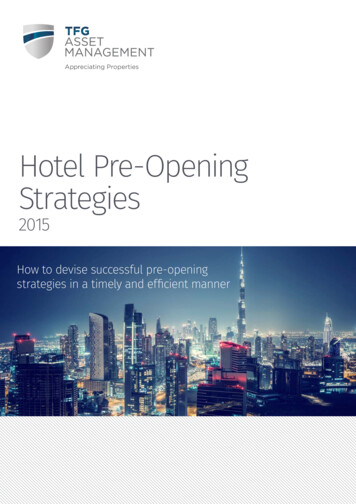
Transcription
Hotel Pre-OpeningStrategies2015How to devise successful pre-openingstrategies in a timely and efficient manner
HOTEL PRE-OPENING STRATEGIES2About TFG Asset ManagementTFG Asset Management specialises in hotel asset management and its primaryobjective is to maximise the hotel owner’s return on investment. The companyassists with every aspect of a completed hotel development and acts as anintermediary between owner and operator, with a view to aligning the interestsand profitability of both parties.TFG Asset Management currently manages three hotel apartment projectsoffering a total of 918 keys and will add four new hotels to its hospitalityportfolio by the end of 2018. The company employs an experienced AssetManagement team and partners with some of the foremost hospitality brands inorder to position and manage its projects with future growth in mind.TFG Asset Management’s main roles include the daily control of hotel operationsand the provision of strategic solutions to enhance revenue generation andproperty values, ensuring they exceed owner expectations.About the AuthorsMr. Mariano FazHead of TFG Asset ManagementEmail: Mariano.faz@tfgam.comContact InformationEmail Address: enquiry@tfgam.comTelephone: 971 4 455 0100Fax: 971 4 455 0200Website: http://tfgassetmanagement.comMs. Mamatha VeeramallaMs. Yung DangEmail: Mamatha.veeramalla@tfgam.comEmail: dang.dung@tfgam.comHospitality - Asset ManagerResearch Analyst
HOTEL PRE-OPENING STRATEGIESContentsAbout TFG Asset Management.2Acknowledgements.4Introduction & Objectives.5Conflicts in a Hotel Management Contract (HMC).6Challenges During the Pre-Opening Phase.8Physical Causes. 8Human Causes. 9Organisational Causes. 9Consequences of Delaying a Hotel Opening.10Flowchart Summary of the Cause & Consequence Analysis atthe Pre-Opening Phase of a New Hotel. 11Pre-Opening Strategies.12Solutions to Physical Causes.12Building Block 1: Hire an SOE Consultant.12Building Block 2: Licensing Requirements. 14Building Block 3: Attention to Detail.15Building Block 4: Test your Equipment and Leave Ample Time for Problem-Solving.15Solutions to Human Causes.15Building Block 5: Training.15Building Block 6: Hire the Best GM at the Right Time. 16Building Block 7: Plan the Incorporation of the Hotel’s Staff. 18Solutions to Organisational Causes.20Building Block 8: Set a Realistic Opening Date.20Building Block 9: Staff Accommodation.20Building Block 10: Plan Hotel Soft Opening.21Conclusion.22Appendices.23Appendix 1 – Package Category for SOE.23Appendix 2 – Legal Documents Required from the Department of Tourismand Commerce Marketing to obtain a hotel licence.242.1 Hotel Initial Approval Requirements.242.2 Licensing Procedures.242.3. Procedures of Licence Printing.24Appendix 3: Legal documents required for FZ-LLC (for hotel licence).253.1 Documents required before a Certificate of Incorporation and licence can be issued:.253.2 Documents required for hotel licence to be issued.26Reference.273
HOTEL PRE-OPENING STRATEGIESAcknowledgmentsTFG Asset Management would like to thank its Head of Asset Management,Mr. Mariano Faz, The First Group’s Group Legal Officer, Mr. Bhuwan Puri, andThe First Group’s Head of Procurement, Ms. Katie Kuuskler, for their invaluablecontribution to this research paper.TFG Asset Management would also like to show gratitude to the HospitalitySenior Managers (HSM) for lending their experience and expertise to assist withour research. In alphabetical order they are:1) Mr. Matt Balcik– Vice President of Operations and Brand Development JumeirahGroup, Dubai2) Ms. Birthe Bolz– General Manager of Auris Metro Central Hotel Apartment, Dubai3) Mr. Agusti Curto Calbet– General Manager of Armada BlueBay Hotel, Dubai4) Mr. Heinz Grub– General Manager of Sheraton Grand Hotel and Area Manager, Dubai5) Mr. Richard Hatter– General Manager of Hotel Icon, Hong Kong and Adjunct AssociateProfessor of The School of Hotel and Tourism Management of HongKong6) Mr. Vincent Miccolis- Area General Manager of The Ascott Limited, Gulf RegionWe are also grateful to Ms. Gemma Greenwood– Director of Content Inc. for her comments and reviews on an earlier version ofthe research paper.4
HOTEL PRE-OPENING STRATEGIES5Introduction & ObjectivesThe hospitality industry is never static but rather shaped and driven by thedynamic, ever-evolving environment in which hotel properties operate.In order to excel and compete, hotel brands must continue to expand theirfootprints and adapt their commercial strategies to meet new challenges.More than 6,405 keys will be added to Dubai’s existing pipeline of approximately64,900 keys by the end of 2015, with plans to add 20,000 more rooms by 2020,according to Dubai’s Department of Tourism & Commerce Marketing (DTCM),highlighting the emirate’s burgeoning inventory supply growth. The majority ofthe upcoming hotels will be operated by well-recognised brands. However, whilemany of these hotel management firms have solid hotel opening experience,the reality is that most pre-opening activities are often delayed, leading to anegative impact on key financial metrics and hotel brand image and equating tomissed opportunities.There are five critical phases of the hotel development process comprising:1) Conceptualisation – the initial stage when the site has been selected andthe concept, basic strategy are being developed to meet agreed targets;2) Site Appraisal & Feasibility Study – the evaluation of the viability of thehotel project. Consulting the authorities is essential during this stage;3) Design & Evaluation – the initial drawing, planning and technical functionsto be submitted to obtain final approvals from the authorities;4) Construction – all equipment, buildings and plants must be checkedbefore being commissioned;5) Pre-opening Activities – this takes place post-handover from the buildingcontractors. Preparation for the hotel opening including hotel positioning,staff recruitment and alignment of operational standards that arenecessary for the hotel to function (Baker, 2000).According to PricewaterhouseCoopers (PwC) research, more than 60% of projectfailures arise during the fifth phase - the pre-opening stage. There are threemain reasons for this:“In order to exceland compete,hotel brands mustcontinue to expandtheir footprintsand adapt to meetnew challenges”1) Missed deadlines – occurring as a result of various delays impactingpre-opening activities;2) Changes in scope – sudden changes in goals, deliverables and tasks;3) Deficient resources – insufficient tools to complete a specific task ontime (PwC, 2007).This research paper, penned by TFG Asset Management, will focus on the fifthphase, identifying and discussing the strategies necessary to address the mostcommon pre-opening issues that arise.In order to enhance the precision of this research paper, TFG Asset Managementsought input from a panel of hotel pre-opening experts. We consulted sixexperienced Hospitality Senior Managers (HSMs) to discuss hotel pre-openingchallenges and strategies. The HSMs provided anecdotes from their storiedcareers, shared their challenges and gave effective advice regarding the subject.Their responses are compiled and illustrated as pie charts in tables 2,3,4,5,6 & 7.
HOTEL PRE-OPENING STRATEGIES6In addition to the valuable discussions with HSMs we interviewed our Head ofTFG Asset Management, Mr. Mariano Faz. We also consulted Ms. Katie Kuuskler,Head of Procurement at The First Group, and Mr. Bhuwan Puri, Group LegalAdvisor at The First Group, in order to improve our depth of understanding ofEquipment Procurement and Legal Requirements.Conflicts in a Hotel Management Contract (HMC)The emergence of the “asset light” era demands a strong commitment andenduring partnership between the hotel owner and hotel operator in eachphase; pre- and post-opening. Both parties often grapple with numerousissues due to disparate interests. The challenge is to overcome these internalroadblocks. In order to mitigate unwanted conflict, the hotel owner may appointa dedicated HAM. The role of a professional HAM is to act as a conduit betweenthe owner and the operator to reduce disagreements arising between the twoparties. The HAM is responsible for developing solutions to operating challengesand providing prudent management and control of the hotel operator’sexpenditure.Under the Hotel Management Contract (HMC), conflicts between a hotel ownerand hotel operator can be grouped into three main categories: Level of control and influence: There is an ongoing debate over to whatextent a hotel owner should take control before and after a hotel opening.Historically, HMCs have heavily favoured management companies. However,since the mid-1980s, the relative bargaining power has shifted towardsthe owner as a result of the rise in the number of hotel managementcompanies and the growing popularity of the asset management concept.Establishing a way to optimise the division of responsibility is highlycritical to ensuring the operator’s corporate-level strategies are adheredto, yet well adapted to the local market (Xiao et al, 2012). It is the reality,specifically in Dubai, that the owner has a higher authority line and degreeof influence during the pre-opening and opening phases. They approveand provide budget for every activity, ranging from staff recruitment toprocuring Small Operating Equipment (SOE), hence they have the right tomonitor the operator’s strategies. However, in a classical scenario, thisrole shifts after the hotel opens. Being an expert in hotel management,the operat
justified budget based on the hotel operator’s original proposal. According to Bolz, the process of preparing the budget to submitting the proposal and gaining approval can take two to four months. Peor-peningb udge: t During the hotel pre-opening stage, the hotel operator is required to prepare a pre-opening budget, which estimates the expenses for various activities, e.g. staff .File Size: 818KBPage Count: 27
